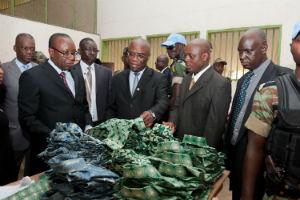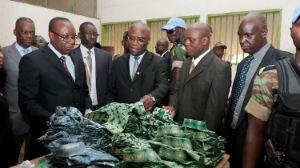
As part of the Mission's activities to monitor and support services relevant to the Rule of Law, Mr. Akodjénou wanted to see the realities, needs and functioning of MACA. He was accompanied by the Director of Administration, the representative of the Directorate of financial affairs and the Ministry of Justice, as well as the representative of the Directorate of legal protection of youths and children.
Speaking at the end of the visit which lasted more than three hours, the Deputy Special Representative in charge of Rule of Law said that it had given UNOCI the opportunity to see how to better accompany the Ministry of Justice and the Prison Administration with regard to the reform of the justice system, especially in relation to detention centres, procedures and detention mechanisms. «As part of the implementation of the mandate of the UN Mission the restoration of State authority, the justice system and prisons are very important areas, » Mr. Akodjénou added.
During the prison visit, the Deputy Special Representative in charge of Rule of Law chatted to prisoners about their situation, their conditions of detention and their return to normal life. He also met with minors. Listening to the concerns of some of the prisoners, Mr. Akodjénou gave them advice and words of comfort. « We wanted to see the environment in which you are living, the sort of food you eat, your health and if your rights are being respected, as well as how you are preparing to return to normal life, » he told them.
The delegation was able to visit the different building in which the prisoners and defendants are being held, their cells, the clinic, the kitchen, the sewing, hairdressing and design workshops, the library and the offices of the prison officers, as well as the printing press. These workshops were set up with the support of UNOCI and other organisations.
Impressed by the work being produced by the workshops, which will help prisoners find a trade when they are released, Mr. Akodjénou said he was satisfied with the atmosphere of peace and understanding which he noticed between the prisoners. He urged them to do all they can to maintain it.
« I am leaving with the impression that a lot has been done in the last few months, » said the Deputy Special Representative, adding that the budget of the Ministry and interest shown on prisons are more significant than they were in the past. « One can see the effect, I also felt this when I visited prisons in the interior of the country. These efforts being made deserve to be supported, accompanied and strengthened so that we can progress, » he added.
However, Mr. Akodjénou acknowledged that there was still a lot to be done. In this regard, he highlighted the dilapidated state of the buildings despite the work that was done. « We should think seriously about revisiting the problem so that prisoners can live in better conditions ».
«I am talking about not only how the prison administrators live but also and especially the prisoners, as well as the efforts that have been made so far by the national authorities. This would help me to have better discussions with the authorities in order to improve the living conditions in prisons, » he said.
For his part, Mr. Ouata said that there were 33 prisons in Côte d'Ivoire with 8000 prisoners. The Director of Prison Administration expressed the hope that UNOCI will help the authorities to maintain the prison in good condition. He highlighted the need to continue to train prison staff. « It is necessary for this training to continue with the arrival of new prison guards who need to learn the basics of the profession which can be described as both military and civilian at the same time, » explained the Director of Prison Administration. He also asked UNOCI to help with providing food for the prisoners. He also revealed that the country was planning to create 10 prisons with the support of UNOCI and other partners like the European Union in the next two years.
The Directorate of Prison Administration is in charge of the management and control of prisons, control and montoring of decisions on loss of freedom, the organisation of work and social services in prisons, the implementation of a progressive system and procedures of contional release of prisoners, proposals for reform of prison administration and the training and social reinsertion of prisoners.
The registrar of MACA, N'Kléban Koné, for his part, highlighted UNOCI's support with regard to prison security. He urged people to visit their relatives and friends who are in prison. « This will reassure them and show them that after their release from prison there are people who are there to welcome them back into normal life because rehabilitating prisoners is the focal point of security
Abidjan Prison is built on 14,543 acres and consists of 11 buildings, including six dormitories for prisoners.






